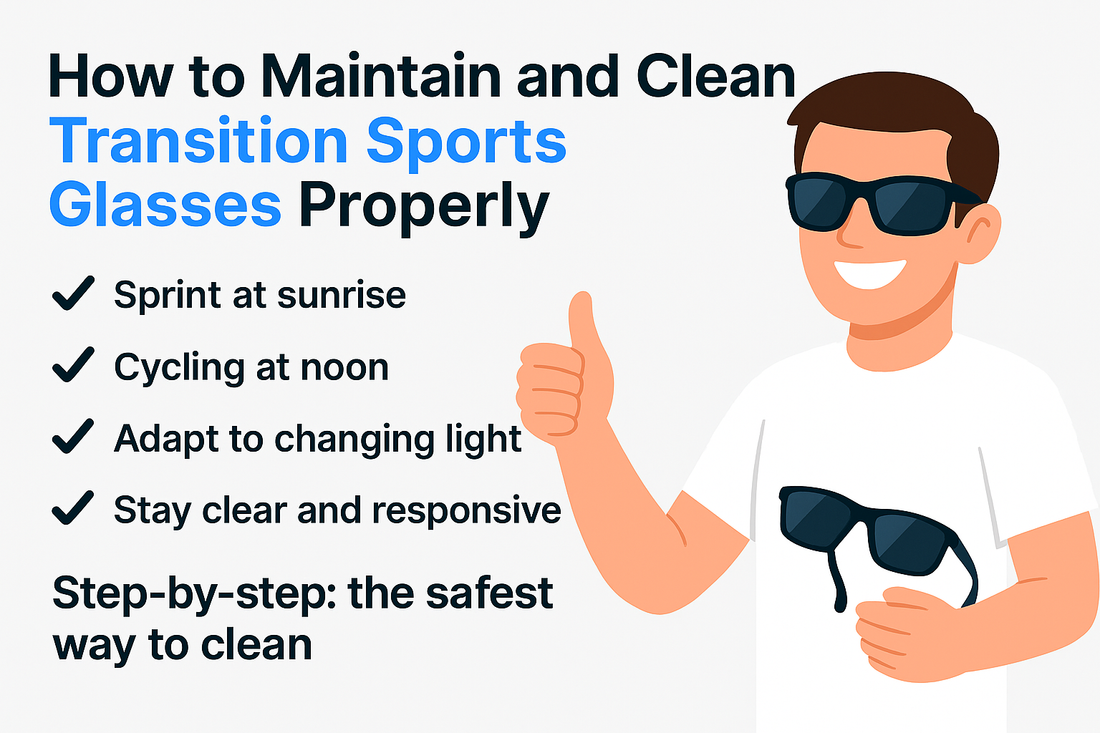
How to Maintain and Clean Transition Sports Glasses Properly
Whether you’re sprinting at sunrise or cycling at noon, transition sports glasses keep up by adapting to changing light. Treat them right and they’ll stay clear, responsive, and comfortable for seasons to come. Here’s your simple, pro-level maintenance plan. 🕶️
Why transition lenses need special care
Transition, or photochromic, lenses use light-sensitive molecules that darken outdoors and clear indoors. Harsh chemicals, heat, and scratches can dull that responsiveness. Good habits prevent hazing, slowdowns, and coating damage.
Your quick-clean toolkit
- Two clean microfiber cloths (one for drying, one for polishing)
- Lens-safe spray or a drop of mild, lotion-free dish soap
- Lukewarm water
- Soft brush or cotton swab for nose pads and vents
- Protective hard case
Step-by-step: the safest way to clean
- Rinse first: Hold glasses under a gentle stream of lukewarm water to float off grit and salt. Never use hot water.
- Add cleaner: Use a lens-safe spray or one small drop of mild dish soap on each lens. Avoid ammonia, bleach, acetone, and alcohol.
- Massage gently: With clean fingertips, work from center to edges. Clean nose pads, bridge, and temple tips.
- Rinse thoroughly: Remove all suds so no residue remains.
- Dry right: Shake off excess, then blot with microfiber. Do not rub with paper towels or shirts.
- Polish: Use a fresh, dry microfiber to finish for streak-free clarity. ✨
Sweat, sunscreen, and real-world messes
After workouts, sweat and salt can crust on frames and hinges. Rinse as soon as you can to prevent corrosion. If you use sunscreen or bug spray, apply it before putting on your glasses and wash hands first. These products can smear lenses and degrade coatings if not cleaned off promptly. 🏃♂️
Anti-fog tips that protect coatings
- Use only anti-fog sprays or cloths labeled safe for AR and photochromic coatings.
- Avoid hacks like toothpaste or shaving cream, which can scratch or leave films.
- Ensure lenses are fully clean and dry before applying anti-fog products.
Drying and storage best practices
- Air dry briefly after blotting, then store in a hard case.
- Keep away from dashboards, sauna lockers, or radiators. Heat can warp frames and reduce photochromic performance.
- Place a small microfiber or desiccant pack in the case to manage moisture.
Keep photochromic performance strong
- Give lenses direct outdoor light regularly so they cycle properly.
- Remember that car windshields often block UV, so lenses may not darken as much inside vehicles.
- In cold weather, lenses may darken more and clear more slowly; in heat, they may darken less and clear faster. This is normal.
Weekly checkup for athletes
- Deep clean frames, nose pads, and vents to remove sweat salts.
- Inspect for loose screws, worn straps, or peeling coatings. Tighten screws gently if needed.
- Wash your case lining and replace old cloths to avoid reintroducing grit.
What to avoid at all costs
- Household glass cleaners, alcohol wipes, vinegar, or bleach.
- Paper towels, tissues, or the hem of your jersey.
- Hot water, hairdryers, or leaving glasses in hot cars. ⚠️
When it’s time to replace
If scratches catch the light or coatings look cloudy, clarity and responsiveness will suffer. Replace the lenses or upgrade the glasses so you’re not compromising safety and performance.
FAQs
How often should I clean my transition sports glasses?
Give them a quick rinse and wipe after each session, and a deeper clean once a week if you train frequently.
What cleaners are safe for photochromic lenses?
Use lens-specific sprays or a drop of mild, lotion-free dish soap with lukewarm water.
Can I use alcohol wipes to disinfect my glasses?
It’s best to avoid alcohol, which can damage coatings. Stick to lens-safe cleaners.
Do transition lenses lose effectiveness over time?
All photochromic lenses slowly age. With proper care and storage away from heat, they perform well for years.
Why aren’t my lenses darkening in the car?
Most windshields block UV, which limits activation. Step outside for full darkening.



